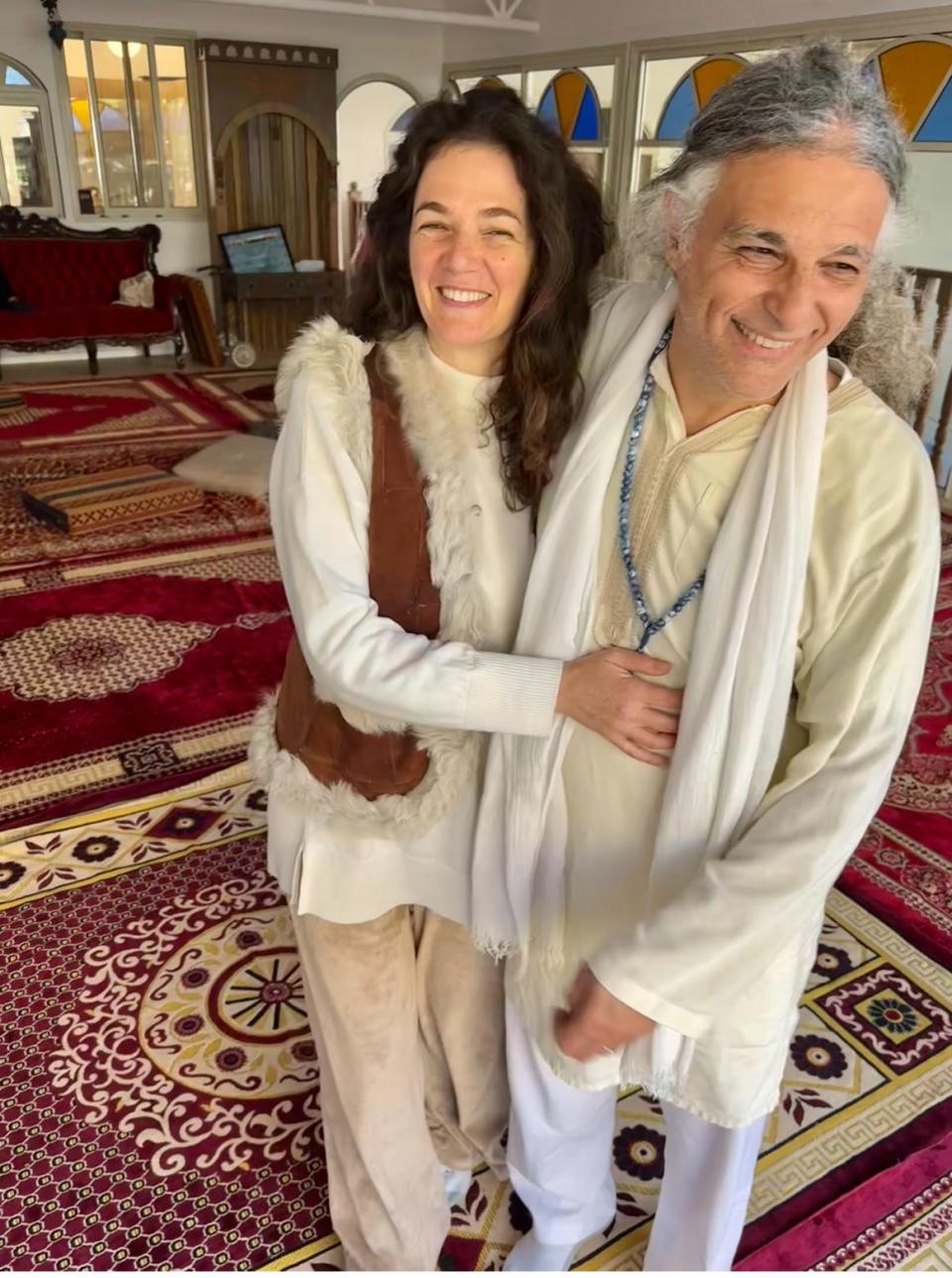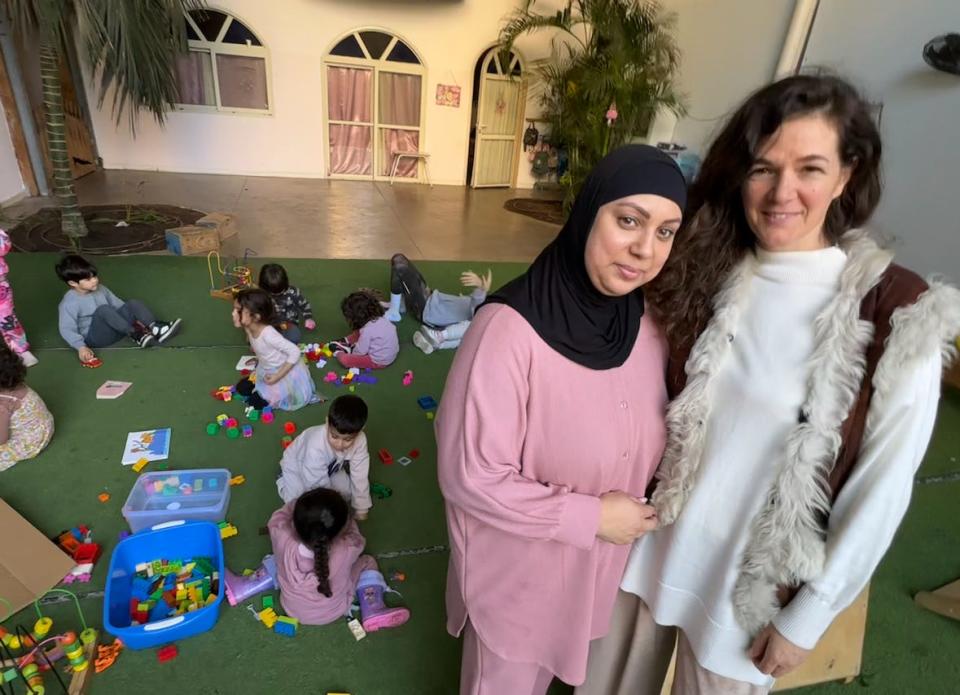As this journey to Israel, the West Bank and Gaza reaches its end, I’ve learned a difficult truth.
The divide between Palestinian and Jew is perhaps as wide as it’s ever been.
Many Israelis who once were for peace doubt after Oct. 7 that they have a partner for it.
And Palestinian anger over Gaza’s ruins has hardened hearts.
Which is why in this final column, I offer a glimpse of hope: a rare school where both Jewish and Arab children share space, and life, and – just maybe – sow seeds of more of that.
It’s owned and run by a mixed couple – of course – and you can’t help but smile when you meet them.
Ora, 47, the Jewish one, has the vibe of 1970s counterculture, and her Muslim husband, Ihab Balha, 53, even more so, with his white robe and salt-and-pepper hair tied back in what would be a ponytail if it weren’t so bushy.

Ora’s father didn’t speak to her for years after she married an Arab. As for Hab, as he’s called, he was raised to hate the Jew.
But across that divide, the two have bonded as kindred souls, and in their odyssey they saw a model to be shared. This school of theirs that I am visiting now, this extraordinary place in Jaffa, has become their life’s work.
It is called the Orchard of Abraham’s school, and, despite its ideals of peace, let me start with the difficult reality they must navigate in Israel in 2024: the first spaces Ora wanted to show me were their new bomb shelters.
They cost $400,000, but her primary mission is to ensure that the children are safe, and now they will be.
The shelters are located throughout the school’s buildings, and as we walk to see one, I ask where the idea for this place came from.
Their firstborn child.
They named him Nur, and realized that, the world being what it is, no matter how hard they worked to teach acceptance of the other, it wouldn’t be enough if their son didn’t live it. The idea was to send him to a mixed school in Jaffa, except there were none there, and few in the country.
So they decided to start one, and today, it’s K-2, with an astonishing 55 staffers and 220 kids – 60% Jewish and 40% Arab.
And now we’re in its newest shelter, a prefab metal one lowered here by crane the day before. It joins a retrofitted kitchen space that they recently hardened with 30 extra centimeters of cement and metal window covers.
I ask how many kids can fit inside each.
Ora smiled. As many as you can and still shut the door. When sirens go off, there is no such thing as being at capacity.
I tell Ora it’s an amusing contrast to see a peace-and-love person so proud of a bomb shelter.
“We don’t want a war,” she explains, “but our children need to be safe.”
That gets me asking if things have gotten harder for her mission since Oct. 7. There’s so much hatred now. Has it affected the kids?
No, she says – if you start young, they accept each other, no matter what’s happening around them.
“We can’t give up,” she tells me, “even when there’s so much pain. We don’t have a choice.”
Then she says simply: “These are our children.”
I ask if the shelters have been used often.
Oh, many times, especially their older shelter. Early in the war, there were missile attacks on Jaffa every day. The car of one of the teachers was hit.
The war has touched them in many ways. A Palestinian staffer lost her uncle, his wife and their three children in Gaza. Ora’s husband, Hab, lost the son of a cousin there. And Orchard’s Jewish families have friends among the Oct. 7 dead, as well as sons serving in the war.
In my weeks here and on the West Bank, this is the first community I’ve found that includes, within it, people on both sides mourning losses, and you sense there is bonding over that.
With the tour finished, I sit with Ora and Hab and ask how they met.
It was at a retreat with a 1960s sensibility – a Zen-like space in the Sinai when Israel still controlled it, unfancy bungalows by the water with few amenities.
The two noticed each other at a nightly bonfire, a Jewish woman and Arab man. As for what happened next, it sounds like an exaggeration, but they really did get married the next day.
“My father didn’t speak to me for two years,” says Ora. “It took him 10 years to be ready to meet Hab.”
What happened when he did?
“He saw Hab didn’t have a tail. He met the person instead of the label.”
As she tells me the story, Hab, sitting next to her, smiles serenely. I ask about his long, white robe, which gives him the look of the kind of guru the Beatles studied under. He says it’s called a jellabiya, and its tranquility reflects who Hab is.
Their son Nur – the one they founded the school for – is now 16. They have two other sons, 14 and 9.
I ask what they’re raising them as. Ora answers simply.
“Humans.”
I assumed Hab had been raised in an accepting Muslim household, but it was the opposite.
“I grew up in a family that taught us to hate Jews,” he said.
His father lost two brothers in the 1948 war, was in a refugee camp at age 14 and was deeply angry. Hab absorbed the same.
How did he overcome it?
A very long journey, he said – which is why they do the work they do. Bridging the Arab-Jew divide is a process.
Since the school is about unwalled spaces instead of closed classrooms, we were talking near a gathering of kids. Ora brings me over to them to speak with Amal Siksek, in hijab, one of the original teachers who helped them found Orchard 16 years ago.


What drew her to this work?
“A child is born as pure,” Amal says. This place seeks to hold on to that.
Although Arab, she uses a Jewish phrase to describe Orchard’s mission: tikkun olam. It means repairing the world. Indeed, many parts of this region are broken, but not this school.
As I prepare to say goodbye, Hab asks what brought me to them.
I tell him I’d mostly come to cover the war. But at least on one day, I wanted to write about hope.
He nods and holds my gaze.
“Inshalla.”
As I begin to walk out, I pass a play area. There are about 25 kids together, Arab and Jewish.
I decide to pause and count how many there are of each.
But I cannot tell one from the other.
This concludes Mark Patinkin’s dispatches from the Middle East. You can reach him at [email protected].
This article originally appeared on The Providence Journal: Visit to Orchard of Abraham’s school in Israel offers hope


